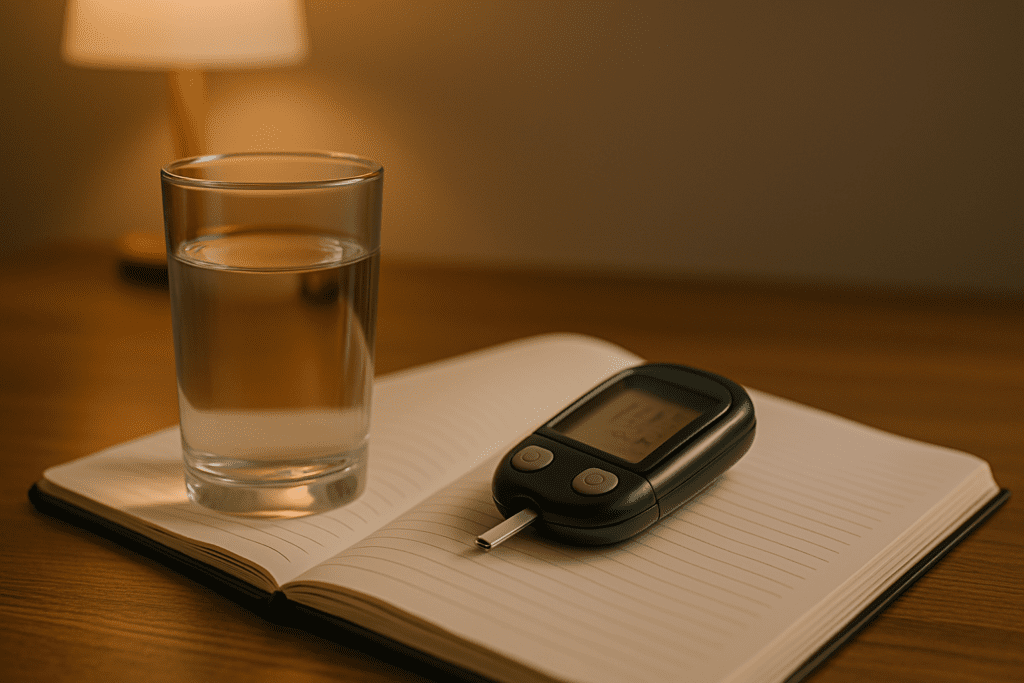Understanding the intricate relationship between hydration status and blood sugar regulation has become a growing area of interest among researchers, clinicians, and health-conscious individuals alike. While blood sugar regulation is often discussed in the context of diet, insulin function, and metabolic disorders, hydration status is an equally critical factor that frequently gets overlooked. The body’s water balance influences multiple physiological systems, from kidney function and hormonal signaling to blood volume and cellular glucose uptake. In fact, even mild dehydration can disrupt glucose homeostasis in measurable ways, and chronic fluid imbalance can create patterns of blood sugar fluctuation that may resemble metabolic dysfunction—even in individuals without diabetes.
You may also like: How Diabetes Affects the Brain: Understanding Brain Fog, Memory Loss, and Mental Confusion from High Blood Sugar
At the center of this connection lies the question: can dehydration cause high blood sugar, or does dehydration cause low blood sugar in some cases? And more importantly, how do these changes manifest in the body, what risks do they carry, and when should one be concerned? These questions are not only scientifically significant but also carry meaningful implications for everyday health decisions, particularly for individuals managing blood sugar disorders or engaging in high-performance physical activity. This article explores the complex relationship between dehydration and blood glucose levels, drawing from scientific literature, clinical insights, and real-world implications to clarify how fluid balance interacts with one of the body’s most vital regulatory systems.

The Physiology of Hydration and Blood Sugar Balance
To appreciate the influence of hydration on blood sugar, it’s important to first understand how both are regulated in the body. Glucose is the primary source of energy for cells, and its movement into and out of the bloodstream is tightly controlled by hormones—primarily insulin and glucagon. This regulation ensures that cells receive adequate energy without allowing glucose levels to rise or fall to dangerous extremes. Simultaneously, water helps maintain blood volume, transport nutrients, and regulate temperature, while also supporting the filtration and excretion functions of the kidneys.
When dehydration occurs, the volume of water in the bloodstream diminishes, leading to hemoconcentration. This results in a relative increase in the concentration of solutes, including glucose. In this way, dehydration and blood sugar levels are inherently intertwined. Hemoconcentration can falsely elevate blood glucose readings, not necessarily because of an increase in glucose production, but due to reduced plasma volume. This is one reason why clinicians often emphasize hydration before conducting fasting glucose tests. Moreover, dehydration stimulates the release of vasopressin (antidiuretic hormone), which in turn can activate cortisol and catecholamines—hormones known to elevate blood sugar by stimulating gluconeogenesis in the liver.
Can Dehydration Cause High Blood Sugar? The Hidden Mechanisms
Among the most pressing concerns is the question: can dehydration cause high blood sugar? The answer, supported by physiological and clinical data, is yes—though the pathways through which this occurs are multifaceted. As mentioned, dehydration leads to a reduced volume of circulating blood. This increases the relative concentration of glucose in the plasma, often resulting in artificially elevated blood sugar levels in lab results. But more than just a statistical artifact, this shift reflects a real metabolic stressor.
In a dehydrated state, the body attempts to conserve water by reducing urinary output, and this process is mediated by antidiuretic hormone. ADH not only reduces water loss but also increases reabsorption of urea and glucose in the kidneys. This retention of glucose can further contribute to elevated serum glucose levels. Additionally, the stress response triggered by dehydration stimulates the hypothalamic-pituitary-adrenal (HPA) axis, resulting in the release of cortisol and adrenaline. These hormones enhance glucose production in the liver to ensure sufficient energy supply, particularly during physiological stress.
Studies have demonstrated that even mild dehydration can increase blood glucose concentrations, especially in individuals with insulin resistance or type 2 diabetes. In these populations, the compensatory mechanisms to manage blood glucose are already impaired, so the added burden of dehydration exacerbates glycemic instability. The result can be hyperglycemia, fatigue, and impaired concentration—symptoms that may be misattributed to other causes if the underlying hydration status is ignored.
Does Dehydration Cause Low Blood Sugar? Exploring the Exceptions
While dehydration is more commonly associated with elevated blood sugar, there are scenarios where the reverse can occur. This leads to an equally important question: does dehydration cause low blood sugar, and under what circumstances might this happen? Though less common, certain physiological conditions do link dehydration with hypoglycemia, particularly when compounded by factors such as medication use, strenuous exercise, or inadequate nutrition.
One such scenario involves endurance athletes or individuals engaging in prolonged physical activity without adequate fluid or carbohydrate replenishment. As sweat loss depletes both water and electrolytes, glucose stores can simultaneously diminish. The result is a dual stressor: reduced plasma volume and declining blood glucose, potentially leading to hypoglycemia. In these cases, the question isn’t just “can dehydration cause hypoglycemia?”—it’s “how quickly can dehydration and glycogen depletion spiral into a medical emergency?”
Additionally, in individuals with diabetes who use insulin or oral glucose-lowering medications, dehydration can impair the body’s ability to clear insulin efficiently. The kidneys, responsible for filtering insulin, slow their function when fluid levels are low. This delayed insulin clearance can intensify the glucose-lowering effect, especially if food intake has been insufficient. In this context, the combination of medication, poor hydration, and reduced caloric intake can significantly increase the risk of hypoglycemia.
Understanding the Bidirectional Relationship Between Hydration and Blood Sugar
It is crucial to understand that dehydration and blood sugar exist in a bidirectional relationship. While dehydration can directly affect blood glucose levels, elevated or diminished blood sugar itself can also influence hydration status. For instance, hyperglycemia—especially at levels above 180 mg/dL—leads to osmotic diuresis. This condition occurs when excess glucose in the bloodstream exceeds the renal threshold and spills into the urine, pulling water along with it. As a result, individuals with uncontrolled blood sugar often experience increased urination and subsequent dehydration.
This creates a vicious cycle: dehydration elevates blood sugar, and high blood sugar leads to further dehydration. In people with diabetes, this cycle can escalate rapidly, leading to complications such as diabetic ketoacidosis (DKA) or hyperosmolar hyperglycemic state (HHS)—both of which are medical emergencies characterized by severe dehydration and extremely high blood glucose levels. Even among non-diabetics, persistent hyperglycemia can contribute to subtle fluid losses that accumulate over time, reducing cellular hydration and affecting cognitive function, mood, and physical performance.
On the flip side, low blood sugar can lead to symptoms like sweating, dizziness, and confusion, which may cause an individual to neglect fluid intake. This behavioral component can indirectly link low blood sugar and dehydration, though the physiological causation is less direct. These examples underscore the importance of recognizing how blood sugar and hydration are co-regulated and how disruptions in one can precipitate changes in the other.
How Can Dehydration Affect Blood Sugar in the Long Term?
When dehydration is not promptly corrected, it can have long-term consequences on glucose metabolism. Chronic low-grade dehydration—a state more common than many realize—can contribute to insulin resistance, particularly in adipose and muscle tissue. The mechanisms behind this involve inflammation, oxidative stress, and altered hormone signaling. When cells are inadequately hydrated, their ability to respond to insulin is compromised, leading to decreased glucose uptake and elevated circulating blood sugar.
Over time, this can progress to metabolic syndrome or type 2 diabetes, especially when combined with poor diet and physical inactivity. Several observational studies have suggested that individuals who consistently consume lower amounts of water have higher fasting glucose levels and greater incidence of insulin resistance. Although correlation does not imply causation, these findings support the notion that hydration status plays a foundational role in metabolic health.
Furthermore, chronic dehydration can exacerbate complications of existing blood sugar disorders. In people with diabetes, poor hydration impairs kidney function, worsens blood pressure control, and increases the risk of cardiovascular disease. Even for individuals without diabetes, consistent dehydration can hinder performance, reduce cognitive sharpness, and lead to unnecessary fatigue—symptoms that may mask or mimic blood sugar imbalances. This highlights the need for adequate hydration not just as a temporary fix, but as a consistent, long-term strategy for blood sugar stability.
Recognizing the Signs: When Should You Be Concerned?
Understanding when dehydration begins to impact blood sugar is key to preventing more serious outcomes. Mild dehydration may initially present with symptoms such as dry mouth, fatigue, and lightheadedness. As it progresses, the symptoms can resemble those of blood sugar irregularities—headaches, irritability, poor concentration, and even visual disturbances. This overlap can make it difficult to discern the root cause without checking both blood glucose levels and hydration markers.
In people with diabetes, frequent urination, increased thirst, and elevated blood sugar readings are telltale signs of dehydration’s influence. If these are accompanied by nausea, weakness, or confusion, it may indicate the onset of DKA or HHS, both of which require urgent medical attention. In non-diabetics, symptoms like shakiness, weakness, and sweating may suggest hypoglycemia—especially if paired with prolonged exercise, poor food intake, or hot weather. In such cases, asking “can dehydration cause low blood sugar?” becomes more than theoretical—it may help guide life-saving interventions.
Practical indicators such as urine color, thirst levels, and changes in mood or energy can also serve as early warning signs. The key is not to wait until symptoms become severe. Regular hydration, especially during illness, heat exposure, or periods of intense activity, is a proactive way to support blood sugar balance. Monitoring blood glucose trends in conjunction with fluid intake can provide clearer insight into the body’s overall state and reduce the likelihood of misattributing symptoms.
Practical Strategies for Staying Hydrated and Supporting Blood Sugar Health
Maintaining optimal hydration doesn’t have to be complicated, but it does require consistent attention. Adults should aim for approximately 2.7 to 3.7 liters of total water intake per day, depending on body size, activity level, and environmental conditions. This includes water from both beverages and food. Individuals managing blood sugar conditions may benefit from slightly higher intakes, particularly during periods of heat, illness, or physical exertion.
Electrolyte balance also plays a crucial role. Sodium, potassium, and magnesium are essential for maintaining cellular hydration and ensuring that water is effectively absorbed and retained. Drinking plain water alone may not be sufficient, especially after intense sweating or diarrhea. In these situations, adding a pinch of sea salt or consuming electrolyte-rich beverages can help prevent the type of dehydration that influences blood sugar control.
Diet also plays a supportive role. Foods with high water content—such as cucumbers, watermelon, oranges, and lettuce—can boost hydration while providing vitamins and fiber that support metabolic health. Reducing intake of sugary drinks and caffeine, both of which can act as mild diuretics, helps preserve hydration status. Additionally, checking blood sugar levels before and after exercise or in response to thirst cues can help identify patterns and guide individualized hydration strategies.

FAQ: Dehydration and Blood Sugar – Complex Interactions and Emerging Insights
1. Can dehydration subtly alter how your body regulates blood sugar levels over time?
Yes, even mild dehydration can affect long-term glucose management by influencing kidney function and insulin sensitivity. When we explore the connection between dehydration and blood sugar, it becomes clear that chronic fluid deficit contributes to more than just short-term fluctuations—it also alters hormonal responses like vasopressin release, which affects glucose production in the liver. In this context, many wonder, does dehydration cause high blood sugar? While dehydration itself doesn’t directly spike glucose, it concentrates blood volume and reduces insulin efficacy, often mimicking hyperglycemia. Conversely, can dehydration cause low blood sugar? Yes, especially when fluid loss coincides with overexertion or missed meals. This bidirectional effect makes hydration a crucial but overlooked part of long-term blood sugar management.
2. How does dehydration influence the accuracy of glucose monitoring tools?
Dehydration can skew readings from both continuous glucose monitors (CGMs) and fingerstick tests. For instance, can dehydration cause high blood sugar readings on a CGM? Yes—since reduced interstitial fluid can alter glucose diffusion rates, the sensor may interpret concentrated glucose as elevated levels. At the same time, can dehydration cause hypoglycemia readings that aren’t reflective of true systemic levels, especially if peripheral circulation is impaired. This raises an important practical point: patients with fluctuating hydration status should calibrate their devices more frequently and compare CGM data with capillary readings to validate accuracy. Understanding the dynamic between dehydration and blood sugar is vital for interpreting trends and avoiding treatment errors.
3. Is there a psychological impact of dehydration-induced glucose instability?
Absolutely. There’s growing evidence that fluctuations in blood sugar—whether due to dehydration or other stressors—can amplify cognitive fatigue, irritability, and poor decision-making. Many patients report that dehydration and blood sugar instability worsen anxiety or depressive symptoms, especially when these fluctuations occur frequently. Moreover, people who chronically underhydrate may not associate mood swings or brain fog with physiological causes. When does dehydration cause low blood sugar versus high? It often depends on a person’s activity level, insulin response, and baseline hydration. These nuances underscore the need for mental health practitioners to consider hydration status as part of comprehensive care for patients with metabolic or mood disorders.
4. Can dehydration affect how medications for diabetes or hypoglycemia are metabolized?
Yes, fluid loss alters the pharmacokinetics of many medications. Dehydration concentrates blood plasma, which can heighten the effects of insulin or sulfonylureas—raising the risk of unexpected hypoglycemia. This raises the practical concern: can dehydration cause low blood sugar during routine medication use? Absolutely. On the other hand, dehydration may also reduce the bioavailability of drugs that depend on adequate blood flow for distribution, making some patients ask, does dehydration cause high blood sugar when their meds don’t seem to be working. In either case, medication plans should be reviewed during heat waves, illness, or intense activity when dehydration risk is higher.
5. Are athletes more vulnerable to dehydration-related blood sugar extremes?
Yes, especially endurance athletes or those following low-carb diets. During prolonged activity, sweat losses can be significant, and without adequate fluid replacement, can dehydration cause hypoglycemia? Yes, particularly if glycogen stores are low and the person doesn’t refuel with fast-acting carbs. Meanwhile, others may see a spike post-exercise and wonder, does dehydration cause high blood sugar during or after workouts? Again, the answer is yes—dehydration elevates cortisol and adrenaline, both of which increase glucose. In this context, dehydration and blood sugar are closely linked in sports performance, making fluid intake as important as nutrient timing for optimal results.
6. What role does age play in the relationship between hydration and blood sugar control?
Older adults are particularly susceptible to the dual threats of dehydration and impaired glucose regulation. With age, thirst perception declines, and kidney function deteriorates, making it harder to retain water and balance electrolytes. This makes one ask, can dehydration cause high blood sugar in older adults? Yes, due to reduced insulin clearance and hormonal stress responses. At the same time, can dehydration cause low blood sugar in this population? Also yes—especially if medications are not adjusted during illness or fasting. Managing dehydration and blood sugar in seniors requires proactive hydration routines and frequent glucose monitoring to prevent avoidable crises.
7. Could nighttime dehydration trigger blood sugar crashes or spikes during sleep?
Emerging sleep studies suggest that nocturnal dehydration affects glucose rhythms through changes in stress hormone release and renal filtration. People who wake up sweating or urinate frequently at night often experience dawn phenomena or overnight hypoglycemia. So does dehydration cause low blood sugar at night? Yes, particularly in individuals on insulin or glucose-lowering medications. Others, however, experience morning hyperglycemia and ask, does dehydration cause high blood sugar after sleep? It can—especially if overnight fluid loss is substantial. Improving hydration before bed (without overdoing it) may help stabilize dehydration and blood sugar interactions while improving sleep quality.
8. Can medical conditions that cause dehydration indirectly alter blood sugar balance?
Yes. Conditions like diarrhea, vomiting, fever, and excessive urination (as in diabetes insipidus) deplete fluid stores and impact glucose metabolism. In these scenarios, can dehydration cause hypoglycemia during illness? Definitely—especially if appetite is suppressed and insulin dosing isn’t adjusted. Yet paradoxically, some patients find that does dehydration cause high blood sugar during fevers or infections? Yes, as cytokine release and stress hormones push glucose upward. These cases illustrate the complex feedback loop between dehydration and blood sugar regulation, emphasizing the need for individualized sick-day management plans that include hydration monitoring.
9. How do hormonal fluctuations affect the dehydration-glucose relationship in women?
Hormonal shifts during menstruation, pregnancy, or menopause can impact both fluid retention and glucose sensitivity. During certain phases of the menstrual cycle, estrogen and progesterone influence kidney function and thirst, altering hydration needs. This makes it possible that can dehydration cause low blood sugar during menstruation, particularly when appetite is low and fluid needs are high. Meanwhile, can dehydration cause high blood sugar during pregnancy? Yes—especially in women with gestational diabetes who require strict hydration and glucose control. Addressing dehydration and blood sugar concerns in women requires a gender-informed approach that integrates hormonal, metabolic, and hydration science.
10. What are some overlooked signs that dehydration is affecting your glucose control?
Often, the early signs of glucose dysregulation from dehydration are subtle: dry mouth, mild dizziness, or blurry vision. These are easy to miss until more extreme symptoms appear. People who notice unexplained fatigue after meals or upon waking may ask, does dehydration cause low blood sugar during the day or night? Yes, especially if fluid intake is inconsistent. Conversely, frequent urination and intense thirst may raise the question: does dehydration cause high blood sugar even when you’re not eating? The answer lies in osmotic diuresis and hormonal imbalances. Recognizing how dehydration and blood sugar interact—even before traditional symptoms emerge—can empower earlier interventions and better metabolic health.

Final Thoughts: Why Hydration Deserves a Place in Every Blood Sugar Conversation
The relationship between hydration and blood sugar is far from peripheral—it is central to the body’s ability to regulate energy, maintain organ function, and prevent metabolic dysfunction. While much of the public discourse on blood sugar focuses on carbohydrates and insulin, it’s increasingly clear that water balance deserves equal attention. Whether you’re asking “can dehydration cause high blood sugar?” or wondering “does dehydration cause low blood sugar?” the answer lies in understanding your body’s unique responses and recognizing how deeply hydration intertwines with metabolic health.
Integrating hydration into conversations about glycemic control is not merely a wellness trend—it is a scientific imperative. From the hormonal shifts triggered by fluid loss to the osmotic imbalances created by elevated glucose, the interplay between hydration and blood sugar is rich, complex, and deserving of greater awareness. For individuals with diabetes, the implications can be life-saving. For those without a diagnosis, understanding these dynamics may prevent the onset of chronic disease altogether.
Ultimately, staying hydrated is one of the simplest yet most powerful strategies for supporting blood sugar regulation. It empowers the body to maintain internal balance, improves physical and cognitive performance, and minimizes the risk of both hyperglycemia and hypoglycemia under stress. As research continues to explore the nuanced connections between hydration and metabolic health, one truth remains clear: water is more than just a thirst-quencher—it is a cornerstone of blood sugar stability.
hydration for metabolic balance, signs of dehydration and blood sugar issues, water intake and glucose control, electrolyte balance and glucose levels, blood volume and glucose concentration, insulin resistance and dehydration, exercise hydration and glucose metabolism, hydration and stress hormone regulation, osmotic diuresis and dehydration, kidney function and blood sugar, high blood sugar symptoms without diabetes, blood sugar regulation and water intake, dehydration and cortisol spikes, vasopressin and glucose retention, hydration during illness and fever, electrolyte-rich foods for blood sugar, managing thirst in diabetes, hydration strategies for endurance athletes, daily water needs for blood sugar health, fluid loss and cognitive function
Further Reading:
How does dehydration lead to hyperglycemia?
Effect of acute hypohydration on glycemic regulation in healthy adults: a randomized crossover trial
How Dehydration Can Spike Your Blood Sugar
Disclaimer: The content published on Better Nutrition News (https://betternutritionnews.com) is for informational and educational purposes only. It is not intended as a substitute for professional medical advice, diagnosis, or treatment. Always seek the guidance of a qualified healthcare professional before making any changes to your diet, nutrition, or wellness practices. The opinions expressed by authors and contributors are their own and do not necessarily reflect those of Better Nutrition News.
Better Nutrition News and its affiliates make no representations or warranties regarding the accuracy, completeness, or reliability of the information provided. We disclaim all liability for any loss, injury, or damage resulting from the use or reliance on the content published on this site. External links are provided for reference purposes only and do not imply endorsement.



